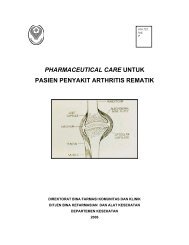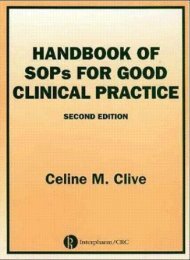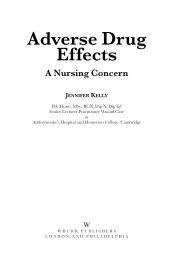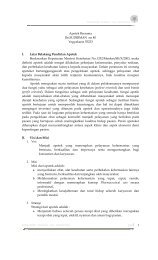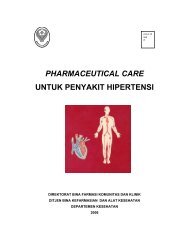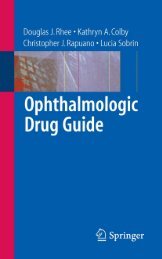- Page 2 and 3:
a LANGE medical bookCURRENTESSENTIA
- Page 4 and 5:
ContentsPreface....................
- Page 6:
ContentsvLife-Threatening Hemoptysi
- Page 9 and 10:
viiiCurrent Essentials of Critical
- Page 11 and 12:
xCurrent Essentials of Critical Car
- Page 13 and 14:
xiiCurrent Essentials of Critical C
- Page 15 and 16:
This page intentionally left blank
- Page 17 and 18:
4 Current Essentials of Critical Ca
- Page 19 and 20:
6 Current Essentials of Critical Ca
- Page 21 and 22:
8 Current Essentials of Critical Ca
- Page 23 and 24:
10 Current Essentials of Critical C
- Page 25 and 26:
12 Current Essentials of Critical C
- Page 27 and 28:
14 Current Essentials of Critical C
- Page 29 and 30:
16 Current Essentials of Critical C
- Page 31 and 32:
18 Current Essentials of Critical C
- Page 33 and 34:
20 Current Essentials of Critical C
- Page 35 and 36:
This page intentionally left blank
- Page 37 and 38:
This page intentionally left blank
- Page 39 and 40:
26 Current Essentials of Critical C
- Page 41 and 42:
28 Current Essentials of Critical C
- Page 43 and 44:
This page intentionally left blank
- Page 45 and 46:
32 Current Essentials of Critical C
- Page 47 and 48:
34 Current Essentials of Critical C
- Page 49 and 50:
This page intentionally left blank
- Page 51 and 52:
This page intentionally left blank
- Page 53 and 54:
40 Current Essentials of Critical C
- Page 55 and 56:
42 Current Essentials of Critical C
- Page 57 and 58:
44 Current Essentials of Critical C
- Page 59 and 60:
46 Current Essentials of Critical C
- Page 61 and 62:
48 Current Essentials of Critical C
- Page 63 and 64:
This page intentionally left blank
- Page 65 and 66:
This page intentionally left blank
- Page 67 and 68:
54 Current Essentials of Critical C
- Page 69 and 70:
56 Current Essentials of Critical C
- Page 71 and 72:
58 Current Essentials of Critical C
- Page 73 and 74:
60 Current Essentials of Critical C
- Page 75 and 76:
62 Current Essentials of Critical C
- Page 77 and 78:
64 Current Essentials of Critical C
- Page 79 and 80:
66 Current Essentials of Critical C
- Page 81 and 82:
68 Current Essentials of Critical C
- Page 83 and 84:
This page intentionally left blank
- Page 85 and 86:
This page intentionally left blank
- Page 87 and 88:
74 Current Essentials of Critical C
- Page 89 and 90:
76 Current Essentials of Critical C
- Page 91 and 92:
78 Current Essentials of Critical C
- Page 93 and 94:
This page intentionally left blank
- Page 95 and 96:
82 Current Essentials of Critical C
- Page 97 and 98:
84 Current Essentials of Critical C
- Page 99 and 100:
86 Current Essentials of Critical C
- Page 101 and 102:
88 Current Essentials of Critical C
- Page 103 and 104:
90 Current Essentials of Critical C
- Page 105 and 106:
This page intentionally left blank
- Page 107 and 108:
94 Current Essentials of Critical C
- Page 109 and 110:
96 Current Essentials of Critical C
- Page 111 and 112:
98 Current Essentials of Critical C
- Page 113 and 114:
100 Current Essentials of Critical
- Page 115 and 116:
102 Current Essentials of Critical
- Page 117 and 118:
104 Current Essentials of Critical
- Page 119 and 120:
106 Current Essentials of Critical
- Page 121 and 122:
108 Current Essentials of Critical
- Page 123 and 124:
110 Current Essentials of Critical
- Page 125 and 126:
This page intentionally left blank
- Page 127 and 128:
This page intentionally left blank
- Page 129 and 130:
116 Current Essentials of Critical
- Page 131 and 132:
118 Current Essentials of Critical
- Page 133 and 134:
120 Current Essentials of Critical
- Page 135 and 136:
122 Current Essentials of Critical
- Page 137 and 138:
124 Current Essentials of Critical
- Page 139 and 140:
126 Current Essentials of Critical
- Page 141 and 142:
128 Current Essentials of Critical
- Page 143 and 144:
130 Current Essentials of Critical
- Page 145 and 146:
132 Current Essentials of Critical
- Page 147 and 148:
134 Current Essentials of Critical
- Page 149 and 150:
136 Current Essentials of Critical
- Page 151 and 152:
138 Current Essentials of Critical
- Page 153 and 154:
140 Current Essentials of Critical
- Page 155 and 156:
142 Current Essentials of Critical
- Page 157 and 158:
144 Current Essentials of Critical
- Page 159 and 160:
146 Current Essentials of Critical
- Page 161 and 162:
148 Current Essentials of Critical
- Page 163 and 164:
150 Current Essentials of Critical
- Page 165 and 166:
152 Current Essentials of Critical
- Page 167 and 168:
154 Current Essentials of Critical
- Page 169 and 170:
156 Current Essentials of Critical
- Page 171 and 172:
158 Current Essentials of Critical
- Page 173 and 174:
This page intentionally left blank
- Page 175 and 176:
162 Current Essentials of Critical
- Page 177 and 178: 164 Current Essentials of Critical
- Page 179 and 180: 166 Current Essentials of Critical
- Page 181 and 182: 168 Current Essentials of Critical
- Page 183 and 184: 170 Current Essentials of Critical
- Page 185 and 186: 172 Current Essentials of Critical
- Page 187 and 188: 174 Current Essentials of Critical
- Page 189 and 190: 176 Current Essentials of Critical
- Page 191 and 192: This page intentionally left blank
- Page 193 and 194: 180 Current Essentials of Critical
- Page 195 and 196: 182 Current Essentials of Critical
- Page 197 and 198: 184 Current Essentials of Critical
- Page 199 and 200: 186 Current Essentials of Critical
- Page 201 and 202: This page intentionally left blank
- Page 203 and 204: 190 Current Essentials of Critical
- Page 205 and 206: 192 Current Essentials of Critical
- Page 207 and 208: 194 Current Essentials of Critical
- Page 209 and 210: 196 Current Essentials of Critical
- Page 211 and 212: 198 Current Essentials of Critical
- Page 213 and 214: 200 Current Essentials of Critical
- Page 215 and 216: 202 Current Essentials of Critical
- Page 217 and 218: This page intentionally left blank
- Page 219 and 220: This page intentionally left blank
- Page 221 and 222: 208 Current Essentials of Critical
- Page 223 and 224: 210 Current Essentials of Critical
- Page 225 and 226: 212 Current Essentials of Critical
- Page 227: 214 Current Essentials of Critical
- Page 231 and 232: This page intentionally left blank
- Page 233 and 234: 220 Current Essentials of Critical
- Page 235 and 236: 222 Current Essentials of Critical
- Page 237 and 238: This page intentionally left blank
- Page 239 and 240: 226 Current Essentials of Critical
- Page 241 and 242: 228 Current Essentials of Critical
- Page 243 and 244: 230 Current Essentials of Critical
- Page 245 and 246: 232 Current Essentials of Critical
- Page 247 and 248: 234 Current Essentials of Critical
- Page 249 and 250: 236 Current Essentials of Critical
- Page 251 and 252: 238 Current Essentials of Critical
- Page 253 and 254: 240 Current Essentials of Critical
- Page 255 and 256: 242 Current Essentials of Critical
- Page 257 and 258: 244 Current Essentials of Critical
- Page 259 and 260: This page intentionally left blank
- Page 261 and 262: 248 Current Essentials of Critical
- Page 263 and 264: 250 Current Essentials of Critical
- Page 265 and 266: 252 Current Essentials of Critical
- Page 267 and 268: 254 Current Essentials of Critical
- Page 269 and 270: 256 Current Essentials of Critical
- Page 271 and 272: This page intentionally left blank
- Page 273 and 274: 260 Current Essentials of Critical
- Page 275 and 276: 262 Current Essentials of Critical
- Page 277 and 278: 264 Current Essentials of Critical
- Page 279 and 280:
266 Current Essentials of Critical
- Page 281 and 282:
268 Current Essentials of Critical
- Page 283 and 284:
270 Current Essentials of Critical
- Page 285 and 286:
272 Current Essentials of Critical
- Page 287 and 288:
274 Current Essentials of Critical
- Page 289 and 290:
This page intentionally left blank
- Page 291 and 292:
This page intentionally left blank
- Page 293 and 294:
280 Current Essentials of Critical
- Page 295 and 296:
282 Current Essentials of Critical
- Page 297 and 298:
This page intentionally left blank
- Page 299 and 300:
286 Current Essentials of Critical
- Page 301 and 302:
288 Current Essentials of Critical
- Page 303 and 304:
290 Current Essentials of Critical
- Page 305 and 306:
This page intentionally left blank
- Page 307 and 308:
Antineutrophil cytoplasmic antibodi
- Page 309 and 310:
Confusion, 227, 234, 235, 239, 240,
- Page 311 and 312:
Endoscopy, 170, 174gastric varices
- Page 313 and 314:
Hyperkalemia (continued)in endocrin
- Page 315 and 316:
Lidocaine, 8, 130, 230, 231, 243Lig
- Page 317 and 318:
Oxygen therapy, 87, 93for hypervole
- Page 319 and 320:
Respiratory failure, 56, 83, 86, 10
- Page 321:
Trismus (lockjaw), 156Trousseau sig





